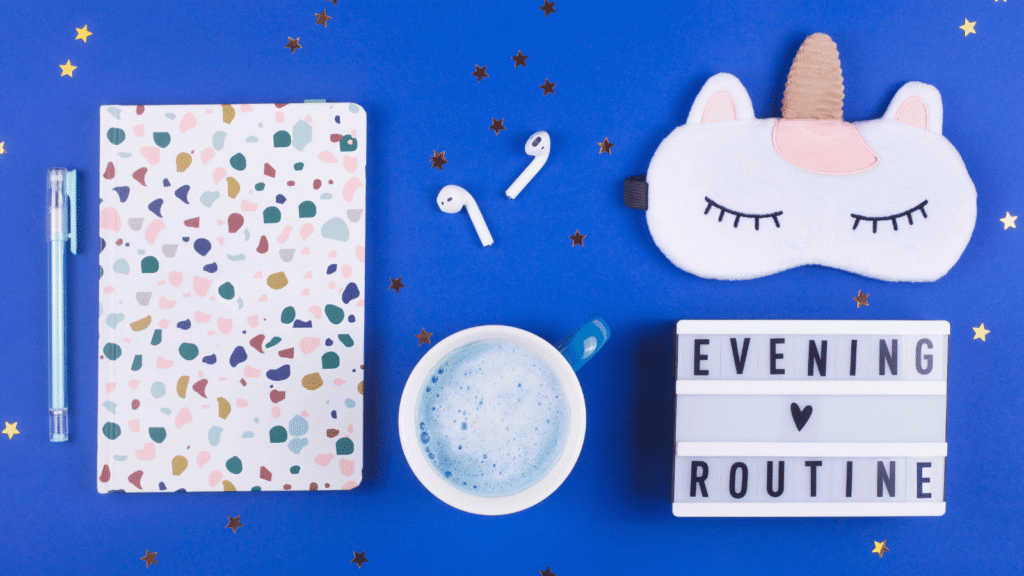A strong evening routine is one of the most underestimated tools for building a calmer mind, better health, and more productive days. Most people focus heavily on morning routines, but the truth is that the way you end your day often determines how you begin the next one. By intentionally shaping your evenings, you create a ripple effect that improves sleep, lowers stress, increases energy, and allows you to step into each morning with clarity. A night ritual doesn’t have to be complicated—it simply needs to be consistent, purposeful, and aligned with your personal goals.
Why an Evening Routine Matters
An evening routine is more than just a way to wind down—it shapes how our body and mind transition from activity to rest. The quality of this transition impacts sleep, emotional balance, and even how productive we feel the next day. When we end our evenings on autopilot, we often carry the stress of the day into our sleep, which leads to poor rest and lower energy. By being intentional, we create a buffer that allows the mind to settle and the body to reset.
From a scientific perspective, a stable evening ritual helps regulate circadian rhythms, which are the natural biological clocks that control when we feel awake and when we feel tired. Disrupting these rhythms, such as by staying up too late or using devices excessively, confuses the brain and lowers sleep quality. Aligning our evenings with these rhythms ensures we work with our biology, not against it.
There are also long-term mental health benefits. Research consistently links evening routines with reduced anxiety, stronger resilience, and better emotional regulation. Taking time to reflect, relax, and plan promotes a sense of control, which is especially helpful in fast-paced lives where stress often feels unavoidable.
An evening routine also sets the stage for greater productivity. By closing the day with purpose, we create clarity for the morning and minimize decision fatigue. Instead of waking up overwhelmed, we wake up with direction. This small shift often leads to consistent progress in work, health, and personal goals.
To summarize, the benefits of an evening routine touch several areas of life:
- Sleep Quality: Improves depth and consistency of rest.
- Mental Health: Reduces anxiety and lowers evening stress levels.
- Productivity: Provides clarity and momentum for the next day.
- Physical Health: Supports recovery, hormonal balance, and energy renewal.
- Emotional Well-being: Builds stability and resilience against daily stressors.
When viewed this way, an evening routine is not just a habit—it’s an investment in physical, mental, and emotional health that compounds over time.

Create a Consistent Sleep Schedule
One of the most powerful parts of an evening routine is training your body to expect rest at the same time every night. Sleep is regulated by our circadian rhythm, the natural internal clock that governs when we feel alert and when we feel drowsy. When we go to bed and wake up at unpredictable hours, we disrupt this cycle and confuse our body’s natural patterns. This leads to grogginess in the morning and reduced mental clarity throughout the day.
Consistency also improves the quality of your sleep stages. Deep sleep and REM cycles occur in predictable patterns, but irregular schedules interrupt these stages, leaving you feeling less refreshed even if you get enough hours of sleep. Over time, this can affect memory, concentration, and emotional resilience.
A helpful way to maintain a consistent schedule is to anchor both ends of your sleep: wake up and go to bed at the same time—even on weekends. It might be tempting to “catch up” on lost sleep by sleeping in, but this often backfires by delaying your sleep the following night. Instead, it’s more effective to go to bed at your usual time and allow your body to reset naturally.
To make your routine more sustainable, try building small cues into your evening that signal bedtime is approaching:
- Dim the lights 30–60 minutes before sleep to trigger melatonin release.
- Avoid caffeine in the afternoon and evening so your body is ready for rest.
- Use calming rituals like reading or light stretching at the same time each night.
If you struggle to stay consistent, keeping a sleep journal can help you notice patterns. Record your bedtime, wake time, and energy levels during the day. Over a week or two, you’ll begin to see how small adjustments impact your energy and mood.
Digital Detox Before Bed
The hours before sleep are some of the most important for restoring balance, yet they’re often hijacked by screens. The constant pull of notifications, late-night emails, or social media scrolling keeps the brain wired when it should be unwinding. A digital detox before bed isn’t just about turning devices off—it’s about reclaiming your time and attention so your mind can transition smoothly into rest.
One of the biggest issues with screens is the blue light they emit, which interferes with melatonin production. This delays your natural sleep cycle and makes it harder to fall asleep quickly. But beyond the biological effect, screens also trigger emotional stimulation. Checking work emails can raise stress levels, while endless scrolling may lead to information overload and comparison fatigue.
Creating healthier boundaries with devices can be simple if approached with intention:
- Turn off screens at least 30–60 minutes before bedtime.
- Use blue light filters or night mode if screen use is unavoidable.
- Keep your phone charging outside the bedroom to remove temptation.
- Replace screen time with calming alternatives like reading, listening to music, or journaling.
For people who struggle with restlessness or dependency on screens, even small steps can make a big difference. A helpful practice is creating a “last scroll” time—choosing a set hour when you consciously stop using social media or messaging apps. Pairing this with a relaxing activity, like brewing herbal tea or stretching, helps the brain associate the end of digital use with the beginning of winding down.
If you find it especially difficult to disconnect from technology at night, my ebook Digital Detox for the Restless Mind offers simple frameworks and daily challenges to break free from screen overuse. It’s a practical way to regain focus, reduce stress, and make evenings more intentional.

Incorporating Relaxation Techniques
Relaxation techniques are the cornerstone of any effective evening routine because they directly help the body shift from a state of alertness to one of calm. While stress activates the sympathetic nervous system, relaxation practices engage the parasympathetic nervous system, which slows the heart rate, lowers blood pressure, and prepares the body for restorative sleep.
One of the most accessible techniques is deep breathing. Simple exercises like the 4-7-8 method—inhale for four seconds, hold for seven, exhale for eight—can slow down racing thoughts and bring instant calm. Gentle stretching before bed is another powerful habit, especially for people who hold tension in their shoulders, neck, or lower back after a long day. Even just five minutes of stretching can release tightness and improve circulation.
For those who prefer mindfulness, short meditation sessions of 5–10 minutes can be highly effective. Apps and guided audio tracks make it easy to follow along, even for beginners. If sitting still feels difficult, body scan meditations—mentally moving through each part of the body and consciously relaxing it—work as a structured yet calming practice.
Other relaxation methods can be integrated depending on personal preference. For example:
- Warm bath or shower: The drop in body temperature afterward signals to the brain that it’s time for sleep.
- Aromatherapy: Scents like lavender, sandalwood, and chamomile help calm the nervous system.
- Progressive muscle relaxation: Tensing and then releasing different muscle groups to let go of hidden tension.
- Calming audio: Nature sounds, white noise, or soft music help create a soothing mental environment.
Some people also find journaling part of their relaxation, as it helps transfer thoughts from the mind onto paper. Others enjoy sipping a warm caffeine-free beverage like chamomile tea, which blends both ritual and relaxation. What matters most is choosing techniques that feel natural and sustainable, rather than forcing a routine that feels like a chore.
Prepare Your Environment for Rest
Your sleep environment plays a bigger role in rest than most people realize. Even small tweaks in your bedroom can dramatically improve sleep quality by signaling to your body that it’s time to wind down. The goal is to create a space that feels calm, safe, and free from distractions.
One of the most important factors is temperature. A slightly cooler room, usually between 60–67°F (15–19°C), helps the body regulate its internal clock and drift into deeper sleep. Too much heat or cold can trigger restlessness, so adjusting your thermostat or using breathable bedding makes a noticeable difference.
Lighting is another element that strongly affects rest. Darkness encourages melatonin production, which prepares the body for sleep. Consider blackout curtains, dimmable lamps, or even a sleep mask if outside light disrupts your room. Keeping lighting soft in the hour before bed also helps train your brain to shift into night mode.
Noise control is equally important. While silence is ideal, some people sleep better with consistent background sounds. Options like white noise machines, soft rainfall tracks, or a ceiling fan can block disruptive noises and create a soothing environment.
The overall design of your space matters too. A cluttered bedroom can create mental unrest, while a clean, organized one promotes calm. This doesn’t mean you need to redecorate—small changes like making your bed each morning, keeping surfaces tidy, and removing unnecessary items can transform the atmosphere.
Here are a few simple adjustments that make a big impact:
- Keep the room cool with breathable bedding or a fan.
- Use blackout curtains or an eye mask to block light.
- Reduce noise with earplugs or white noise.
- Remove unnecessary electronics from the bedroom.
- Add calming scents like lavender or chamomile through diffusers or pillow sprays.
By shaping your environment intentionally, you’re not just creating a bedroom—you’re building a sleep sanctuary. These details may seem small, but together they form the foundation for restorative nights and more energized mornings.

Reflection and Journaling
Reflection is one of the most powerful ways to end the day because it creates space between the busyness of life and the stillness we need before sleep. Journaling gives structure to that reflection, helping us make sense of our thoughts instead of letting them swirl endlessly in the mind. By transferring ideas, worries, or wins onto paper, we lighten the mental load and free ourselves for rest.
There are many approaches to journaling at night, and each serves a different purpose. For example, gratitude journaling trains the brain to notice positives, which improves mood and resilience. Reflective journaling, on the other hand, helps us process what went well, what didn’t, and what lessons can be carried forward. Some people even use journaling as a tool for problem-solving, because writing down a challenge often makes the solution feel clearer.
Here are a few prompts you might explore in your evening routine:
- What were three things that went well today?
- What challenges did I face and how did I handle them?
- What am I grateful for right now?
- What is one small win I want to carry into tomorrow?
If you prefer more structure, you can also use a simple table format like this:
| Reflection Prompt | Your Response Example |
|---|---|
| Today’s Highlight | Had a meaningful talk with a friend |
| Lesson Learned | Need to manage breaks better |
| Gratitude | Grateful for a warm meal tonight |
| Tomorrow’s Focus | Finish writing project |
Journaling doesn’t need to be long or polished. A few sentences or bullet points are enough to shift the mind from restless to calm. Over time, these reflections build a written record of growth, helping you see patterns in your thoughts, emotions, and behaviors. It’s both a tool for daily peace and a long-term way to track personal progress.
Plan for Tomorrow
Planning for tomorrow is one of the simplest yet most powerful parts of an evening routine. It helps clear mental clutter, reduces morning stress, and gives you a clear direction as soon as you wake up. Instead of starting the day feeling scattered or overwhelmed, you begin with focus and purpose. Even a few minutes of preparation in the evening can save you hours of wasted energy the next day.
One effective approach is to identify your top three priorities for the following day. These are the tasks that will make the biggest difference in moving you closer to your goals. Writing them down ensures they don’t get lost in the noise of smaller, less important tasks. It also helps you resist the temptation of procrastination by giving you a roadmap for where to start.
You can also prepare in practical ways that reduce decision fatigue. For example:
- Laying out clothes so you don’t spend time choosing in the morning
- Packing your work bag or organizing essentials you’ll need
- Prepping simple meals or snacks to save time and energy
- Setting reminders or alarms for important commitments
For some people, a simple priority table helps bring clarity:
| Task | Priority Level | Time Needed |
|---|---|---|
| Write project report | High | 2 hours |
| Respond to emails | Medium | 30 minutes |
| Morning workout | High | 45 minutes |
This type of plan makes it easier to start the day with intention rather than reaction. It doesn’t have to be rigid; the goal is to reduce stress and ensure your energy is directed where it matters most.
If you often find yourself delaying important tasks even after planning them, my ebook The Procrastination Reset can help you break the cycle of putting things off. It offers practical, step-by-step methods for turning plans into action without feeling overwhelmed.

Limit Caffeine and Late-Night Eating
What we put into our bodies in the evening can make or break the quality of our sleep. While caffeine and heavy meals are the most obvious culprits, there are other less-considered factors that influence how well we rest. The goal is not to eliminate everything, but to be more mindful of timing and portion sizes.
Caffeine stays in the system much longer than most people realize. Even a late afternoon cup of coffee can disrupt deep sleep hours later. It’s not only coffee—energy drinks, green tea, black tea, and even dark chocolate contain enough caffeine to interfere with rest. A practical approach is to set a personal cut-off time for caffeine, ideally before mid-afternoon.
Late-night eating also plays a role because digestion continues while we’re trying to relax. Heavy meals close to bedtime often cause discomfort, acid reflux, or disrupted sleep cycles. Foods high in fat, sugar, or spice are particularly disruptive at night. Alcohol can also appear to relax us but it shortens restorative sleep stages, leaving us groggy.
Healthier evening alternatives can satisfy cravings without disturbing rest:
- Warm herbal teas such as chamomile or peppermint
- A small banana or handful of nuts for light nourishment
- A glass of warm milk, which contains tryptophan to support relaxation
Here’s a quick comparison of foods and drinks to avoid versus those that are sleep-friendly:
| Avoid in the Evening | Better Alternatives |
|---|---|
| Coffee, black/green tea | Herbal tea (chamomile, rooibos, peppermint) |
| Energy drinks | Warm water with lemon |
| Spicy or greasy foods | Steamed vegetables, light soup |
| Alcohol | Warm milk, caffeine-free golden milk |
| Sugary desserts | Fresh fruit or Greek yogurt |
By making these swaps, you don’t have to sacrifice comfort—you simply give your body what it needs to rest. Small choices add up, and with consistency, these mindful adjustments make evenings smoother and nights more restorative.
Build Rituals That Stick
The most powerful evening routines are the ones that feel natural enough to sustain over time. A ritual doesn’t need to be complicated; it simply needs to be repeatable and meaningful. What matters is that the habits you choose fit your lifestyle and align with your personal goals, rather than forcing yourself into routines that feel unrealistic.
One useful approach is to anchor new habits to things you already do. For example, if you always brush your teeth before bed, you can use that moment as a trigger to begin journaling, reading, or stretching. Over time, your brain associates the first action with the next, making the ritual easier to follow without thinking.
Another helpful technique is to keep your rituals enjoyable. People often abandon routines when they feel like chores. Choosing habits that bring you a sense of calm, joy, or accomplishment increases the likelihood that you’ll stick with them long-term.
Here are a few practical examples of simple rituals that are easy to maintain:
- Turning off bright lights and switching to a lamp or candle at a set time each night
- Brewing a caffeine-free tea while you reflect on the day
- Reading five pages of a book before sleep
- Writing down tomorrow’s top three tasks in a planner
- Practicing three minutes of mindful breathing to calm the mind
Tracking progress can also help reinforce consistency. A simple checklist or habit tracker provides visual proof of your efforts, which builds motivation. When you see how often you’ve kept up with your routine, it becomes harder to break the streak.
Finally, remember that flexibility matters. Life will occasionally disrupt your evenings, and that’s okay. Rituals should adapt with you rather than break when you miss a step. The key is to return to them the following night without guilt, allowing your routine to grow with your lifestyle instead of working against it.

Final Thoughts
A well-designed evening routine is not about perfection—it’s about creating space for rest, reflection, and preparation. By prioritizing sleep consistency, reducing screen time, practicing relaxation, and planning for tomorrow, we set ourselves up for calmer nights and more productive mornings. Over time, these habits compound to improve focus, energy, and emotional well-being. Evening rituals are a gift you give yourself, and once you experience the benefits, you’ll wonder how you ever managed without them.
FAQs





